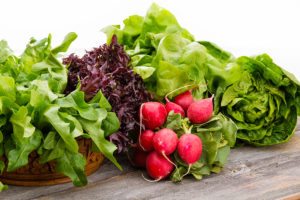Could Veggies Treat Colon Cancer?
Colon cancer is number three on the most common forms of cancer in the United States.
According to the American Cancer Society, 97,220 new cases of colon cancer are expected to occur in the U.S. this year, and it could cause more than 50,000 deaths. Fortunately, scientists are continuing to research new treatments for the disease. Recently, they discovered that vegetables might play an important role.

Home Health Care Murray UT: Veggies Treat Colon Cancer
Study Reveals Promising Vegetable-Based Treatment
Colon cancer occurs in the large intestine. It is usually diagnosed in people who are aged 50 or older. People who are of African American descent are also at higher risk. Doctors also believe that the way a person eats impacts their risks for the disease, which is part of the reason that the findings of this new study are so interesting.
Scientists in Singapore conducted a study using a combination of cruciferous vegetables and probiotics. Cruciferous vegetables include kale, broccoli, cauliflower, and Brussels sprouts. When the compounds from these vegetables were mixed with probiotics, researchers found that mice used in the test experienced a 75 percent decrease in tumors.
One of the more exciting things about this study is that the active ingredient in this potential new treatment, sulforaphane, is one that is produced in the human body when cruciferous vegetables are eaten. Scientists just made it more effective by giving it a boost with probiotics. Because the sulforaphane attacks cancer cells it leaves the healthy cells unharmed.
Preventing Colon Cancer
Although the information revealed in this new study is relatively new and requires more research, it can’t hurt to add some additional cruciferous vegetables to your aging relative’s diet. Some other cruciferous vegetables are:
- Bok choy
- Cabbage
- Kohlrabi
- Broccoli
- Turnips
- Mustard greens
- Arugula
- Radishes
- Turnips
- Collards
Other steps you can take to help prevent colon cancer are:
Dietary Changes: Research shows that the risk of colon cancer increases in people who eat a typical Western diet. However, eating a diet that is high in fiber and low in fat could reduce the risk. A new diet should also include plenty of fruits, vegetables, and whole grains.
Lose Weight: If the older adult is overweight, getting to a healthy weight can help.
Exercise: Being physically active has a number of health benefits, including reducing colon cancer risks.
Furthermore, a senior care provider can assist in your efforts to reduce your loved one’s colon cancer risks. Eldercare providers can prepare healthy meals that conform to the dietary recommendations. They can even help the older adult to grocery shop. Senior care providers can also remind the person about upcoming doctor’s appointments and cancer screenings.
Are you or a loved one considering Home Health Care in Murray, UT? Please talk to the friendly staff at December Rose Senior Care at Home. Providing Home Care in Highland, Utah and Surrounding Communities.
801-427-ROSE (7673)
Sources
- What to Do After Your Loved One Has Been Diagnosed with Dementia - February 21, 2020
- Risk Factors for Alzheimer’s Disease - February 5, 2020
- The Main Reasons Why Family Caregivers Don’t Get Enough Sleep - January 22, 2020

